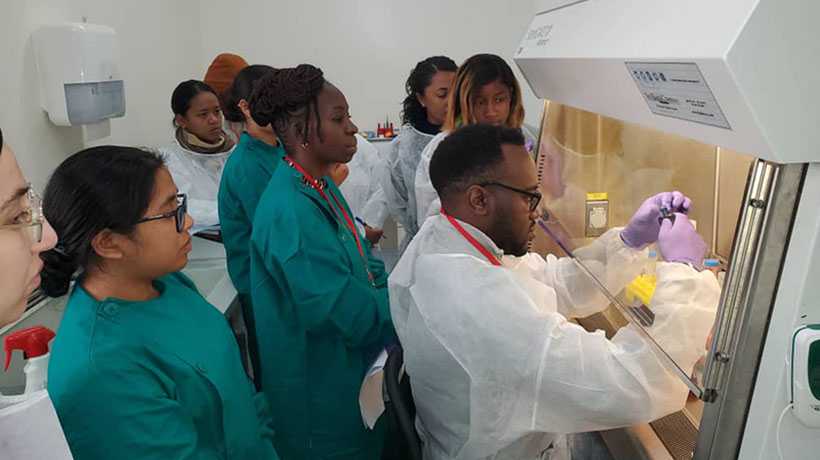News
APRECIT-BIS: aiming for innovative screening and better treatment of TB infection in Madagascar and Cameroon

As part of the APRECIT-BIS project funded by the ANRS-MIE, a workshop was held at the Institut Pasteur in Madagascar from June 27 to July 5, 2023, to transfer technology and train users in new screening systems for TB infection (TBI).
‘Our long-term objective is to support health authorities in charge of dealing with TB in Madagascar and Cameroon as they improve the identification and treatment of populations infected with tuberculosis,’ said Dr. Jonathan Hoffmann, head of the APRECIT-BIS project and of the TB program at the Mérieux Foundation. To achieve this objective, the Mérieux Foundation, in partnership with the Institut Pasteur in Madagascar and the Pasteur Center in Cameroon, is coordinating technology transfer and the evaluation of three innovative approaches to screening and treating TBI.
Invited to attend this scientific workshop were five participants from the Institut Pasteur in Madagascar, three from the Pasteur Center in Cameroon, a representative from SATVI (South African Tuberculosis Initiative), University of Cape Town, a representative from the Hospices Civils de Lyon and three representatives from the Mérieux Foundation. The program for the workshop included technology transfer and training in two innovative tests for TB infection, TASA (T-cell Antigen-Specific Activation assay) and the RISK6 test, transferred respectively by SATVI and the Mérieux Foundation.
Dr. Munyaradzi Musvosvi, a researcher at SATVI responsible for the technology transfer of the TASA test to the participating teams, said he was very optimistic about the results of assessments carried out during this intensive week. ‘It was a great experience to interact face to face with scientists who are passionate about testing and improving existing techniques for screening for TB infection and I think that this exercise will be highly enriching for all the participants involved in the project. It’s very exciting to see how engaged the participating teams were during the week. While these tests are still being evaluated, we are confident that their development will improve, giving Madagascar and Cameroon better strategies for dealing with TB,’ he said.
The training provided during APRECIT-BIS will help to strengthen the skills and techniques already acquired during the APRECIT project by the teams working at the Pasteur Center in Cameroon and at the Institut Pasteur in Madagascar.
Dr. Valérie Donkeng from the Pasteur Center in Cameroon shared her delight with the experience: ‘We have learned a lot during the APRECIT-BIS project, particularly about the use of the two new TASA and RISK6 tests. This will allow us to make the most of the biobank maintained during the APRECIT project and to develop other research topics on TB biomarkers. […] We hope that the data gathered during the project will allow the tests to be optimized so that they can be used in countries with limited resources.’
About APRECIT-BIS
Operating in Madagascar and Cameroon, the APRECIT-BIS project involves transferring and evaluating three innovative approaches (TASA, RISK6 and a plasma protein assay) to improve TBI screening and precisely identify the beneficiaries of preventive treatment.
This project is part of the overall objective of helping national programs for dealing with TB to achieve the major objectives of the WHO’s END TB strategy, which aims to eradicate TB worldwide by 2035. APRECIT-BIS strengthens local capacities for TB diagnosis, research and development and helps with the implementation of innovative, simple, robust and cost-effective approaches in the field to address both TB infection and TB disease.
